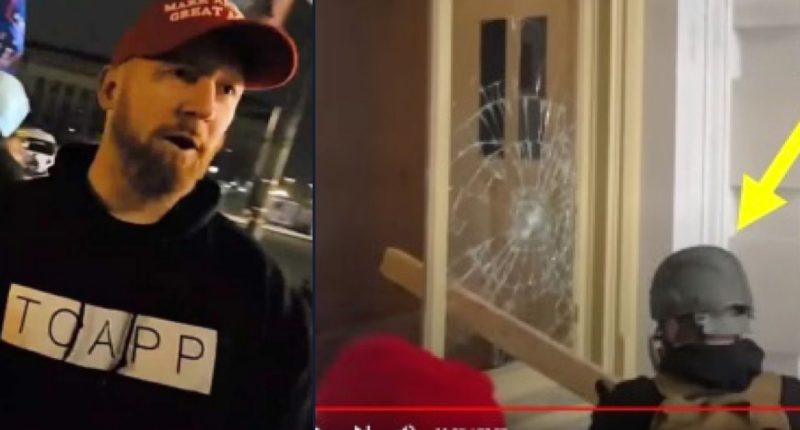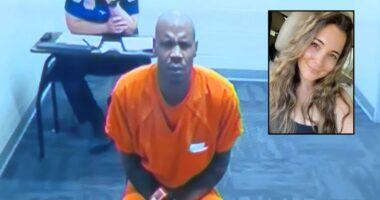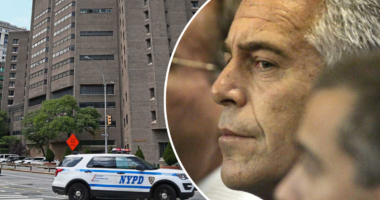Share this @internewscast.com
Edward Kelley (images via FBI court filing).
The Justice Department, under President Donald Trump, initially resisted attempts to overturn the conviction of a Jan. 6 defendant. Now, they are advocating for this individual, found guilty last year of planning to murder FBI agents, to receive a life sentence. The defendant argues this request is based on “scandalous and unsubstantiated” claims, including “uncharged allegations” that are irrelevant.
Edward Kelley, aged 35, was convicted by a federal jury in Tennessee in November on charges that include conspiracy to murder federal employees, soliciting violent crime, and threatening a federal official. The government submitted a sentencing memorandum on Tuesday, urging for life imprisonment due to the “unquestionably serious” nature of Kelley’s actions.
“The defendant is remorseless,” the DOJ charged.
“From even before the current convictions, through the commission of his crimes, and continuing after the trial, the defendant’s actions show a complete lack of remorse and a likelihood to continue his criminal acts after release,” the government noted. “Not only does he refuse to take responsibility, but he also sees himself as a victim of wrongdoing by the FBI, the United States, trial witnesses, the jury, and the Court. Instead of seeking rehabilitation, he takes pride in his offenses.”
Kelley’s attorney, Mark Brown, filed their response on Wednesday.
“The unsubstantiated and uncharged allegations referenced therein place Kelley in a false light and should not be part of the record in this case,” Brown said.
Love true crime? Sign up for our newsletter, The Law&Crime Docket, to get the latest real-life crime stories delivered right to your inbox.
Kelley, a Maryville resident, tried claiming earlier this year that his federal murder plot case and conviction in the Volunteer State were “related to events that occurred at or near the United States Capitol on Jan. 6, 2021,” according to court documents. He filed a motion to dismiss his indictment and to vacate his jury convictions on Jan. 27, one week after Trump issued his executive order pardoning alleged rioters. The DOJ urged U.S. District Judge Thomas Varlan to uphold Kelley’s conviction, condemning his claims as “wrong” and Kelley, himself, for having “no authority supporting his position.”
In March, Varlan — a George W. Bush appointee — agreed with the DOJ and rejected Kelley’s court bid to get his murder plot conviction covered by Trump’s pardon, saying “none of the substantive offenses or charging provisions overlap” in the way Kelley has claimed in filings.
“Motivated by a desire to initiate a civil war and to retaliate for his previous arrest, Kelley was committed to executing his plan,” the DOJ said Tuesday. “[Kelley] took steps to access weapons and ammunition. Although he claims to have gifted his weapons and ammunition to a friend, the evidence in the case makes clear his effort to ensure access to his arsenal in order to effectuate his plan.”
In his Jan. 6 case, Kelley was found guilty of three felonies — civil disorder, destruction of government property in an amount over $1,000 and assaulting, resisting, or impeding certain officers — for storming the Capitol building and attacking a police officer.
Evidence presented at a separate trial in Knoxville, Tennessee, showed how he “developed a plan to murder law enforcement” while his Jan. 6 charges and trial were pending. Prosecutors said Kelley compiled a “kill list” of FBI agents and employees who were probing him and his Jan. 6 conduct, which he then distributed to “conspirators,” along with images of the targets. They described how Kelley planned “assassination missions” for each of his targets and talked about them with others.
“Beginning with a comparison of defendant’s substantive offenses, there is no overlap whatsoever between the indictments in the D.C. and Tennessee Cases with respect to charging statutes or substantive conduct alleged,” Varlan said in his March ruling. “None of the substantive offenses or charging provisions overlap. Moreover, counsel for both parties did not attempt to relate these unrelated substantive offenses at trial.”
In determining whether Kelley’s Tennessee case fell within the scope of Trump’s blanket pardon, Varlan said he evaluated “relations of time and place” and “other potential relations.” He found that the case “lacks a sufficient causal connection” to the events that occurred at or near the U.S. Capitol on Jan. 6, “for the purposes of the pardon” — noting how Trump’s order “situates” related events as being within the “physical vicinity” of the Capitol.
“These crimes are serious and undeniably dangerous,” the government said Tuesday. “He continues to believe he was justified in targeting East Tennessee law enforcement for assassination and was duty-bound as a self-proclaimed patriot to do so.”

















